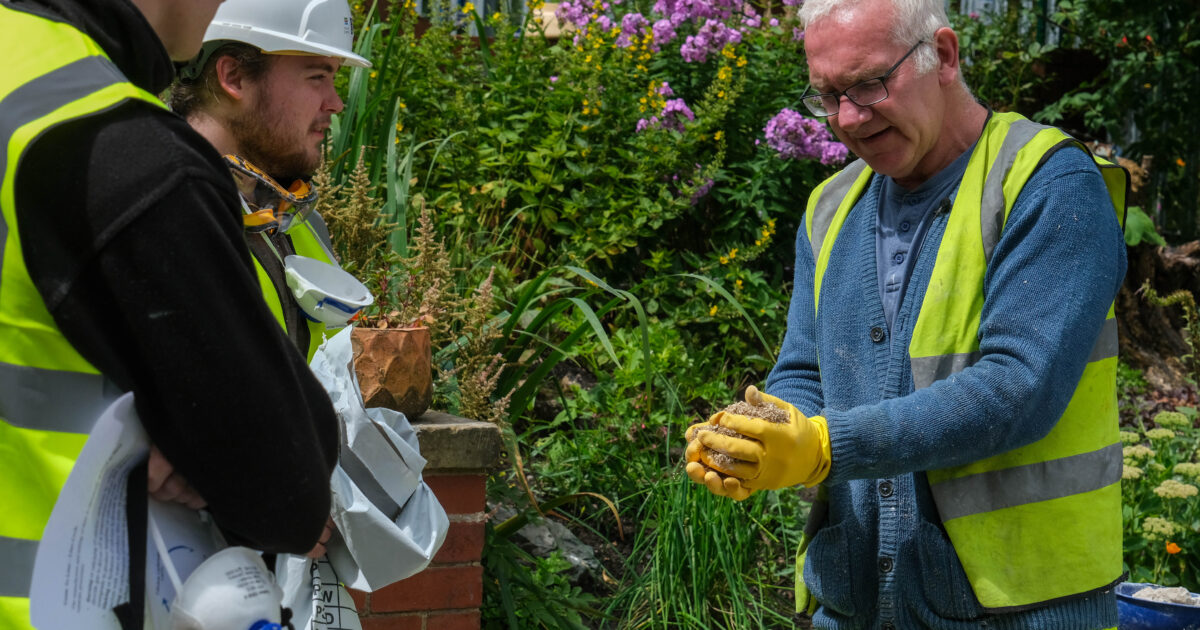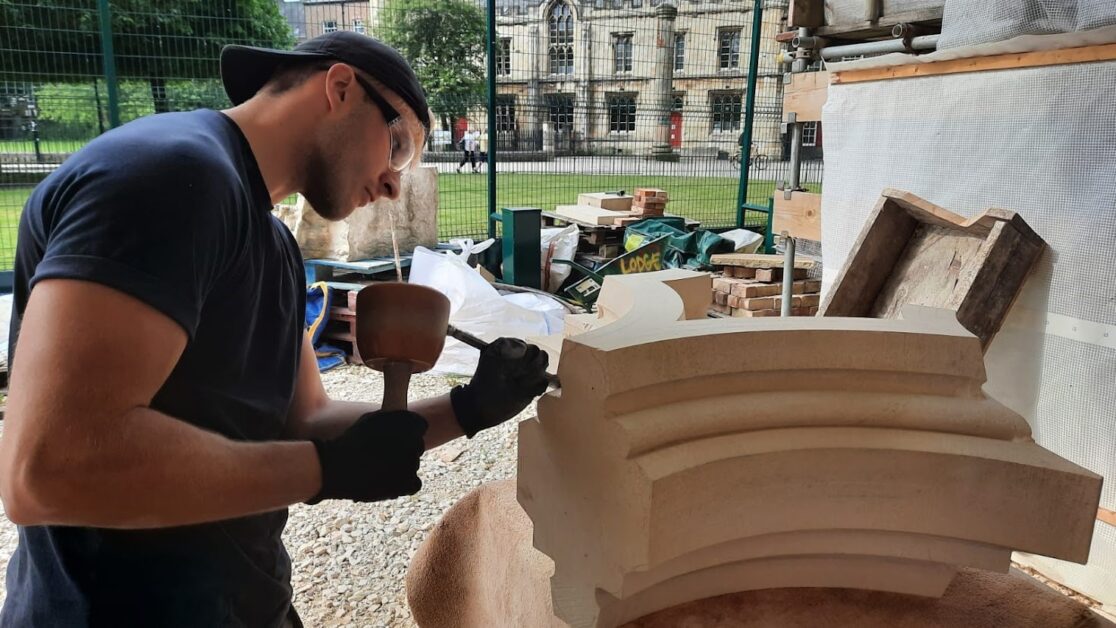Executive Summary
Key Findings from January 2025’s UK Heritage Pulse Survey on heritage sector impact measurement and evaluation:
- Over half of the sector are reporting their impact – whilst 29% regularly publish impact reports, an additional 38% report less frequently or as required by funders
- 79% of heritage professionals say they have a clear understanding of how to report their organisational impact
- 75% of panel members’ organisations have received support from The National Lottery Heritage Fund, with 43% describing it as transformative
January’s survey of 311 UK heritage professionals shows strong sector commitment to impact measurement despite evaluation complexities. Leaders across museums, historic sites, and community heritage projects demonstrate cautious optimism while acknowledging operational challenges.
The sector broadly views evaluation positively, finding it useful, necessary, helpful, and transparent, though larger organisations and volunteer-led groups report more complexity. Internal evaluation based on an organisation’s own chosen criteria is strongly preferred by respondents (83%), with external evaluation more common for larger organisations. Areas that panel members were most interested in tracking were engagement with, and understanding of, their area of heritage, their impact on conservation, and their organisation’s capabilities and resilience.
In its anniversary year, the National Lottery Heritage Fund’s impact has been reported as substantial, with respondents characterising it as supportive, transformative, and essential. Nearly 90% of funded organisations report transformative or significant organisational changes, highlighting the Fund’s important role in the sector.
“Lottery funding has fundamentally changed the visitor offer and made it fit for the 21st century.”
“National Lottery Heritage Fund has been a saviour for the project, enabling us to keep our heritage asset in good condition and essence.”
The National Lottery Heritage Fund has served as a vital lifeline for heritage organisations, with broad agreement about its crucial role in sector survival through challenging times.
Pulse Monitor
Taking the pulse of the people who care for our shared heritage:
- Organisational survival confidence highest since September 2024
- Heritage care capacity shows a concerning decline
- Staff retention remains a challenge, with a continuing decline in those intending to stay at their current organisation, a 16-month low.
The January 2025 Pulse Monitor reveals a sector demonstrating resilience in organisational sustainability while grappling with operational pressures and workforce dynamics. Panel members’ confidence in handling cost and recruitment challenges has reached its highest point since September 2024, with 70% expressing optimism about overcoming these issues.
However, this organisational optimism contrasts with growing concerns about heritage care capacity. Since a low in March 2024, panel members have been becoming more confident about caring for collections and heritage assets. However, their confidence dropped in January, hinting at new resource challenges to be addressed.
The workforce landscape presents a particularly nuanced picture. Despite the average commitment score falling to a 16-month low of 7.1/10, more than half of panel members indicated a commitment to staying with their organisations. This split response illustrates varying experiences across the sector.
Survey Report (Impact and Evaluation)
In January, a total of 311 UK Heritage Pulse panel members responded to at least one question in the survey. The first section of the survey asked respondents about monitoring and reporting on the impact of what they do. Following this, to mark 30 years of grant-giving, the survey asked about their experience receiving funding from the National Lottery Heritage Fund. The final section asked the monthly “Pulse Monitor”, questions which track the individual and organisational resilience of respondents.
Measurement of impact in the heritage sector
Over 75% have a clear sense of what reporting on the overall impact of their organisations involves
If you were asked to “report on the overall impact” of your organisation over the past 12 months, would you have a clear sense of what that involves?
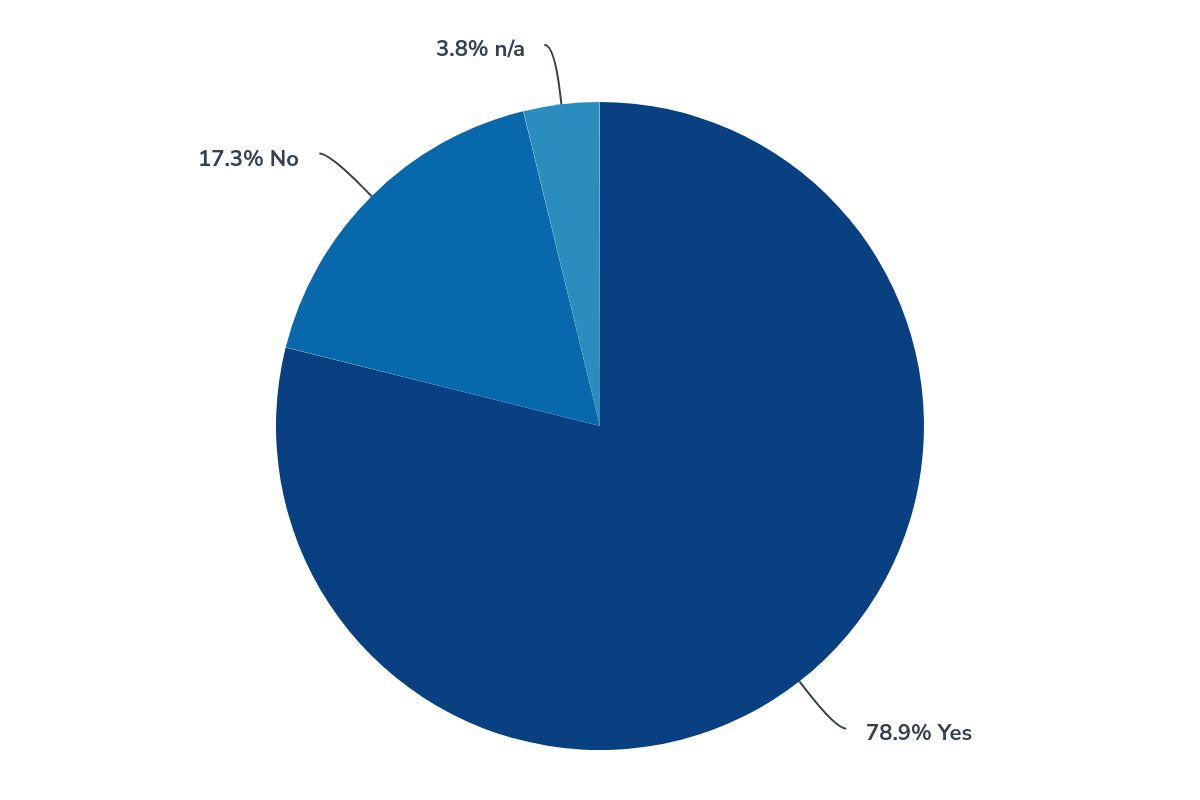
n=237
While nearly 80% of respondents said that they know the steps needed to measure the impact of their work over the previous 12 months, one in six said they did not have a clear sense of what this process would involve.
Respondents want to be able to understand, measure and explain about engagement with and understanding of their area of heritage
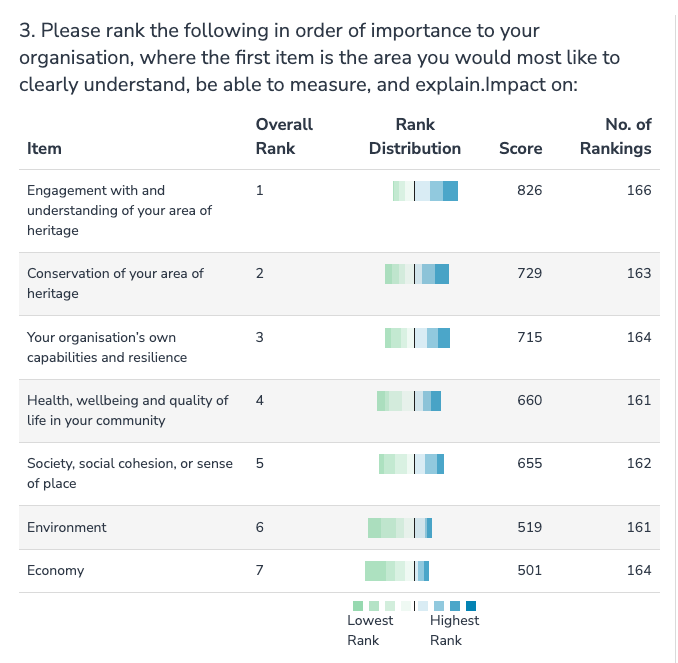
n=166
Amongst panel members, the impact on the environment and the economy are the areas they would prioritise least when understanding and measuring impact. There is no change in the rankings when segmenting for organisations with turnover above and below £1 million.
However, when looking only at voluntary organisations (n=36), measuring and understanding the impact of conservation of their area of heritage is their priority to understand and measure.
Evaluation is seen as useful and necessary, but views on its complexity vary widely
We asked respondents on a four-point scale which competing pairs of adjectives they most associate with evaluation. When thinking about evaluation, respondents (n=161) are:
- Much more likely to think it is useful rather than useless (mean average of -1.26)
- Much more likely to consider it necessary rather than unnecessary (mean average of -1.25)
- More likely to think it is transparent rather than mysterious (mean average of -0.75)
- More likely to consider it helpful rather than painful (mean average of -1.03)
- Undecided as to whether it is straightforward or complex (mean average of 0.08)
Drilling down into respondents’ views on whether evaluation is straightforward or complex, organisations with a turnover of more than £1 million (n=31, mean average of 0.19) are slightly more likely to find evaluation complex than organisations with a turnover of less than £1 million (n=107, mean average of 0.05).
Voluntary organisations (n=35, mean average of 0.28) are less likely to find evaluation straightforward than organisations with paid employees (n=126, mean average of 0.02).
Organisations prefer to use self-evaluation and internal criteria to improve their work
Which types of evaluation do you use to improve your organisation’s own practices and programmes?
| All responses | Turnover above £1 million |
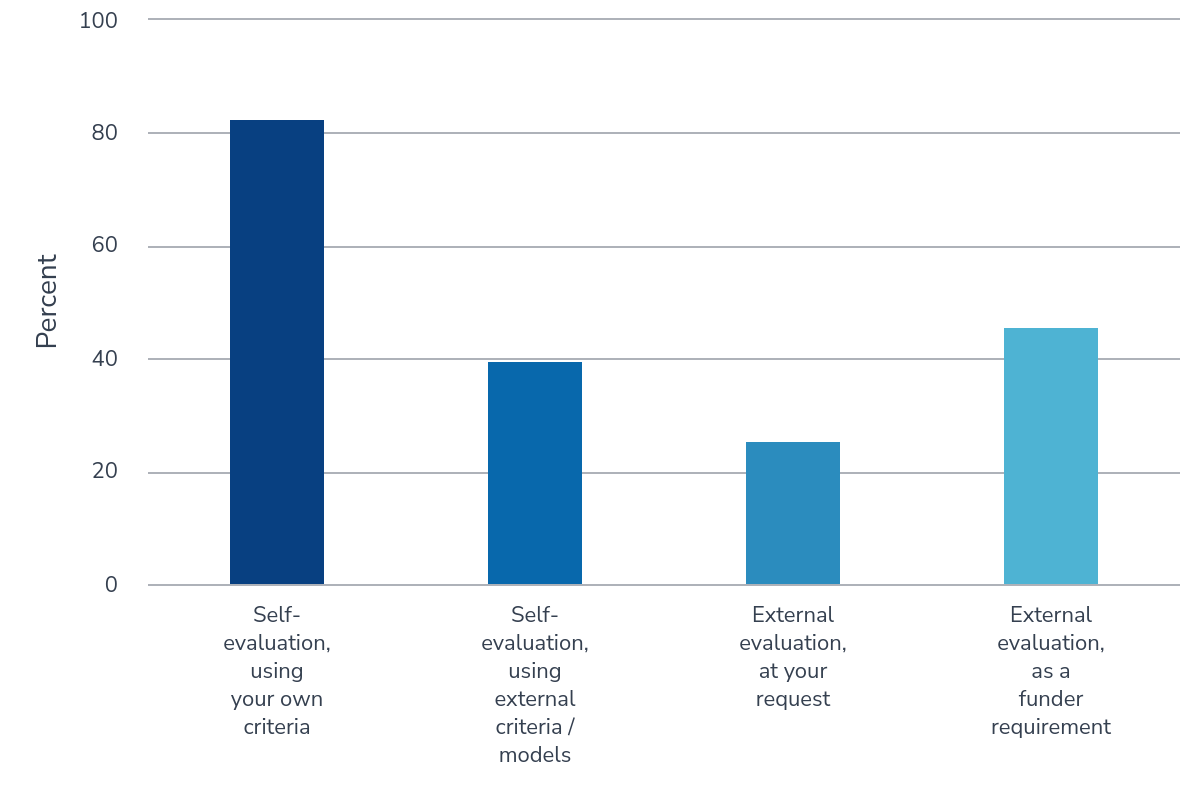 | 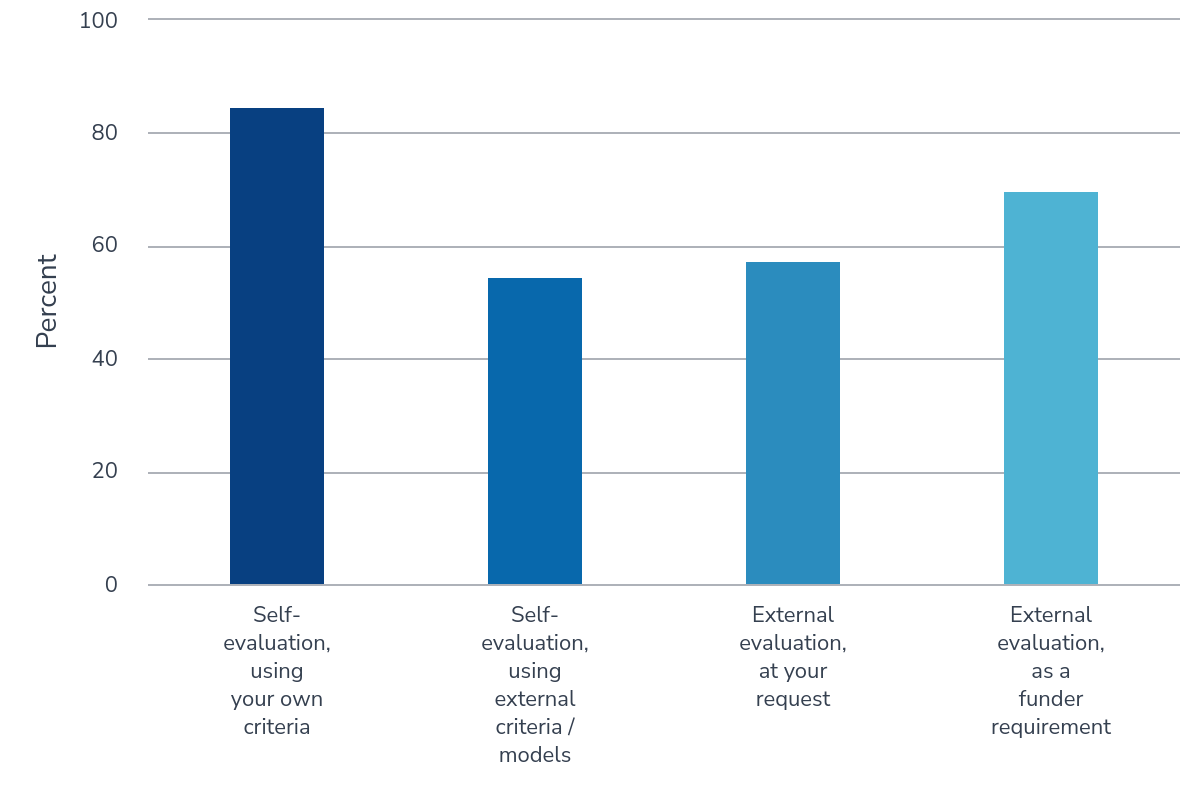 |
| n=148 | n=28 |
Panel members have a strong preference for internal evaluation using their own criteria (83%), with 46% using external evaluation as a funder requirement. When segmenting for larger organisations with a turnover of over £1 million, the use of external evaluation increases, however, self-evaluation using internal criteria is still the most frequently used method.
Larger organisations prioritise regular reporting on their impact
Does your organisation report externally on its impact?
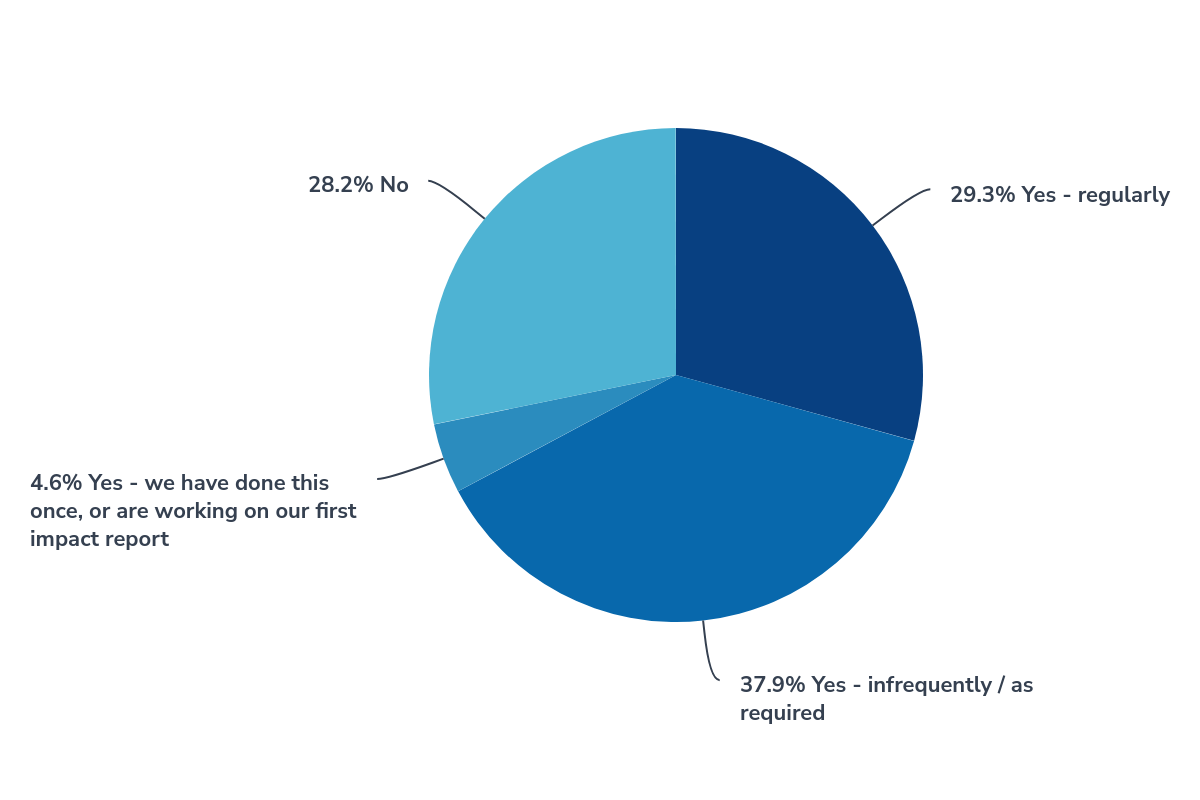
n=174
| Turnover below £1 million | Turnover above £1 million |
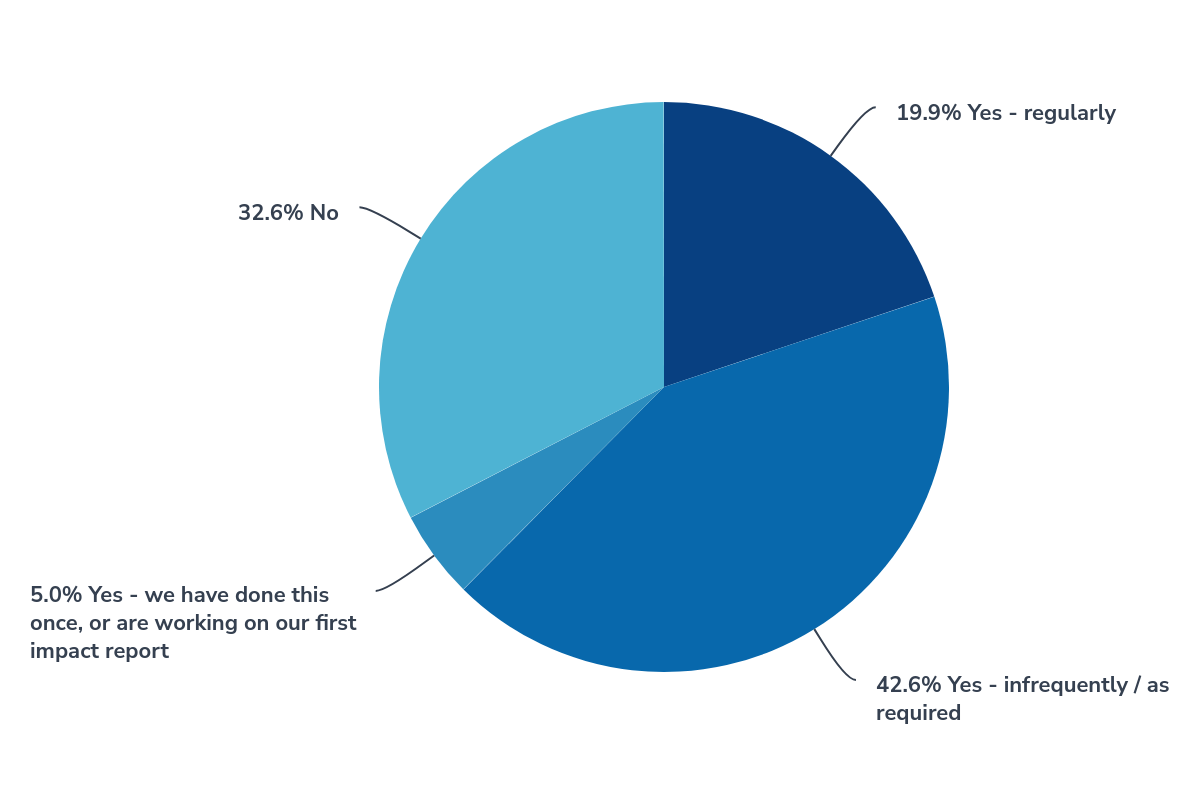 | 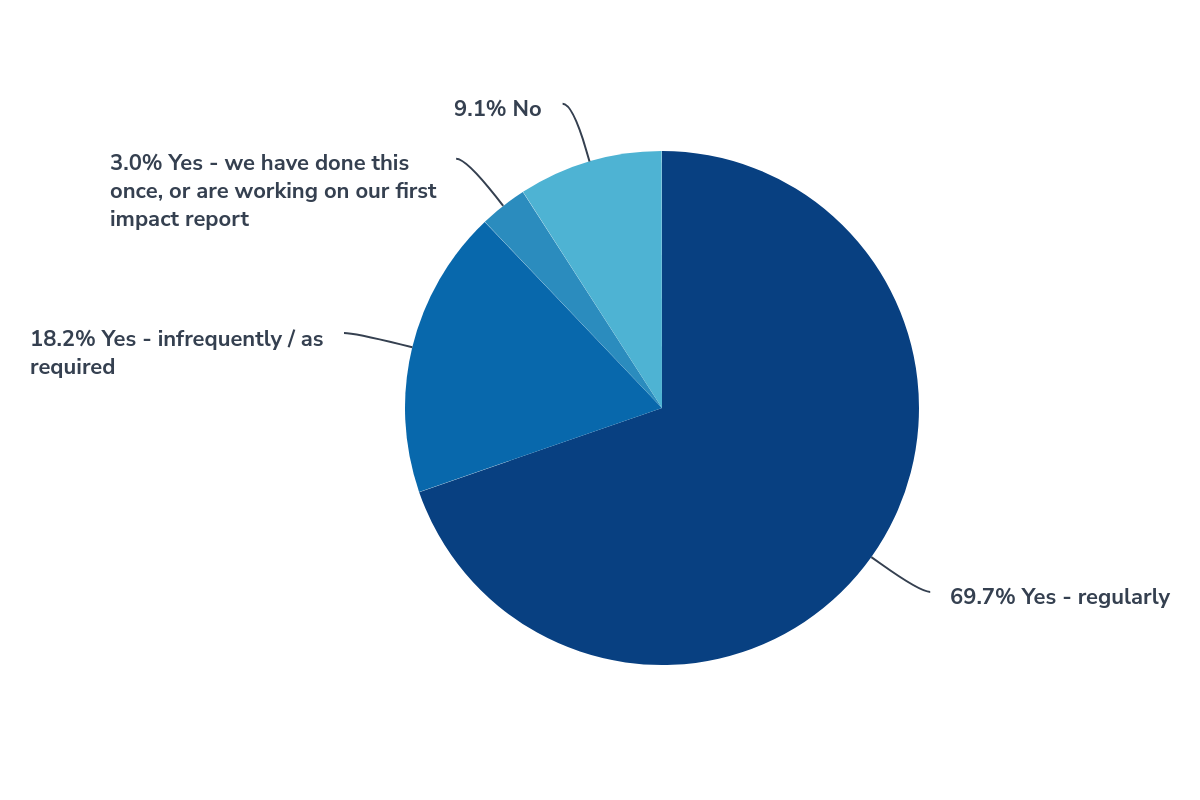 |
| n=141 | n=33 |
Considering the panel as a whole, 29% report regularly on their impact. When segmenting for organisation size, those with a turnover of less than £1 million do not prioritise reporting regularly on their impact, with only 19% of respondents doing this. By contrast, 70% of organisations with a turnover of over £1 million regularly report externally on their impact.
Read more The National Lottery Heritage Fund provides good practice guidance for evaluation which can be read at heritagefund.org.uk/funding/good-practice-guidance/evaluation
Experience of receiving funding from the National Lottery Heritage Fund
“Supportive, transformative, essential” – panel members value the impact of the Fund during its anniversary year
What three words would you use to describe the impact of National Lottery Heritage Fund funding on your organisation and its area of heritage?
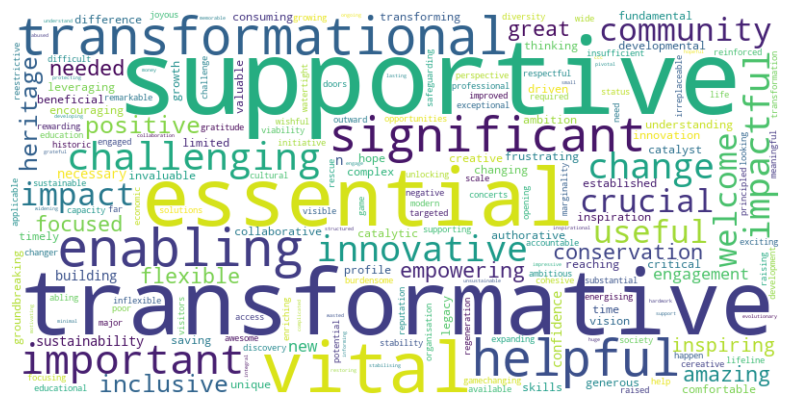
n=513
The responses demonstrate a strong positive perception of the National Lottery Heritage Fund’s impact on organisations, with “supportive” and “transformative” emerging as the most frequently cited descriptors, mentioned 23 and 22 times respectively. These terms, along with “essential” (17 mentions) and “vital” (13 mentions), show that lottery funding plays a crucial role in sustaining the sector and developing its work.
The consistent use of impactful words like “transformational” and “enabling” (12 mentions each), alongside “helpful” (11 mentions), further reinforces that panel members view lottery funding as more than just financial assistance – it represents a catalyst for meaningful change and organisational development. The language chosen by respondents indicates that this funding stream is viewed as both a fundamental resource and an agent of positive transformation.
The full list of responses is available in the appendices of this document.
Over 80% of panel members who received funding believe the Fund made a significant or transformational difference to their organisation and its work
What difference has receiving funding from the National Lottery Heritage Fund made to your organisation and its work?
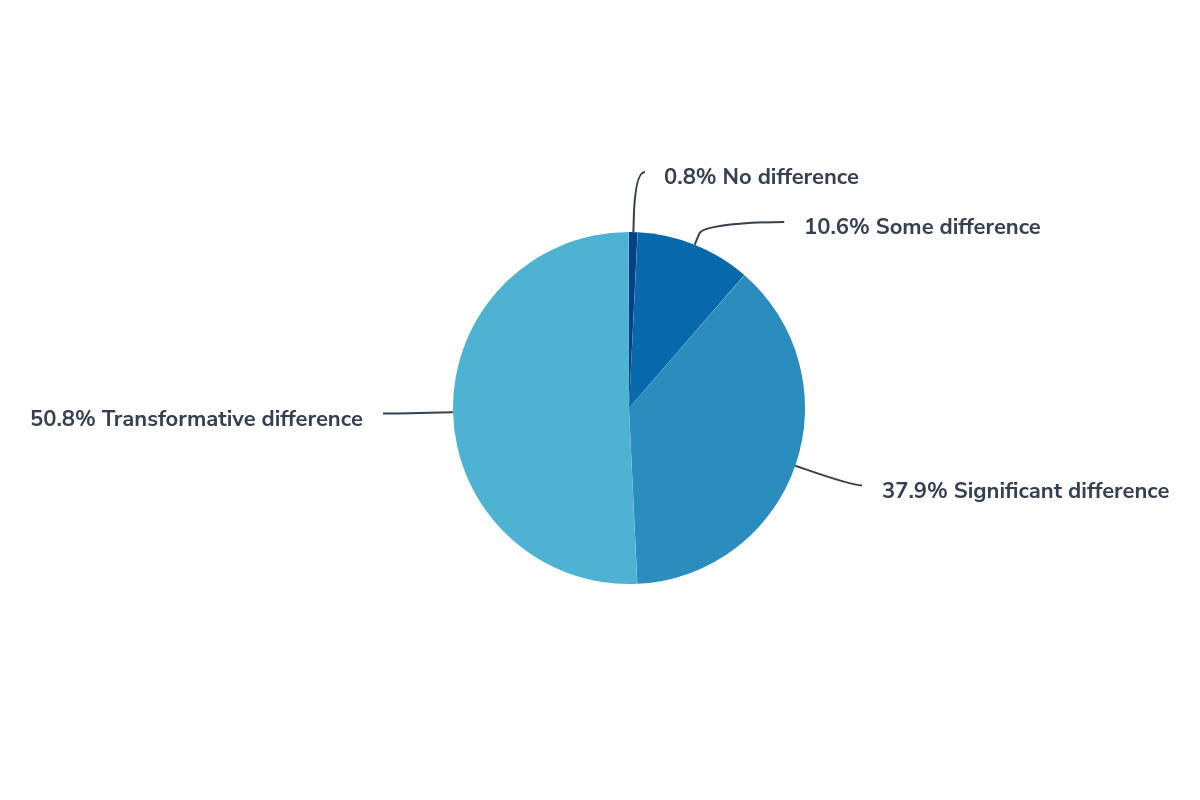
n=132
Nearly all respondents who received funding from the National Lottery Heritage Fund said that it had made a difference to their organisation and work. Following this, we asked panel members to explain this impact further in a free-text qualitative question. Using a Large Language Model (LLM), we were able to analyse and categorise these responses, identifying several themes.
Firstly, looking at the responses (n=110), they can be grouped under two broad categories – the specific impact of the fund to their organisation, for example through capital projects (75%), or the general impact it has on an organisation or the sector, such as through providing mentoring or other advice (25%).
Specific impact of The National Lottery Heritage Fund
| Category | Count |
| improvements to buildings; | 25 |
| increased community engagement; | 21 |
| improved organisational stability; | 12 |
| widened the scope of the organisation; | 7 |
| created training programmes; | 6 |
| funded or supported specific work or projects; | 6 |
| changed or improved the organisation; | 4 |
| improved organisational governance; | 3 |
Looking at some examples of the testimonies provided by panel members around the improvements the Fund has enabled to buildings:
“I have worked on a series of major capital developments for various organisations. In all cases, the lottery funding has fundamentally changed the visitor offer and made it fit for the 21st century.”
“We have received funding for the conservation and restoration of a wide range of heritage sites and features, and without these would have either been lost or deteriorated to the point they could not be used for productive outcomes.”
The Heritage Fund has also enabled respondents to change their approach to community engagement:
“We changed our community engagement style across the whole of the UK to a more community led approach, which has been hugely successful for us in reaching more people.”
“National Lottery Heritage Fund has been a saviour for the project, enabling us to keep our heritage asset in good condition and essence.”
General impact of The National Lottery Heritage Fund
| Category | Count |
| helped organisation or sector to continue its work; | 12 |
| allowed projects to take place and heritage to remain open; | 8 |
| provided non-financial support including mentoring, advice and tools; | 3 |
| regenerated the community through funding of heritage; | 3 |
| negative view of the Heritage Fund; | 3 |
In terms of the general impact, there was most consensus around the difference the Heritage Fund has made in keeping the work of heritage organisations going:
“The [Heritage] Fund is our biggest funder supporting multiple projects across the UK at any one time; we would have very much less impact without this source of funding.”
“Our organisation would probably have closed without intervention from the Fund.”
Signposts The National Lottery Heritage Fund supports projects right across the UK. Find out more at… heritagefund.org.uk/funding
Pulse Monitor
Pulse Monitor is a monthly health check on the heritage sector, measuring the resilience and confidence of both people and organisations in the heritage sector.
Panel members’ confidence they can overcome cost and recruitment challenges continues an upward trend
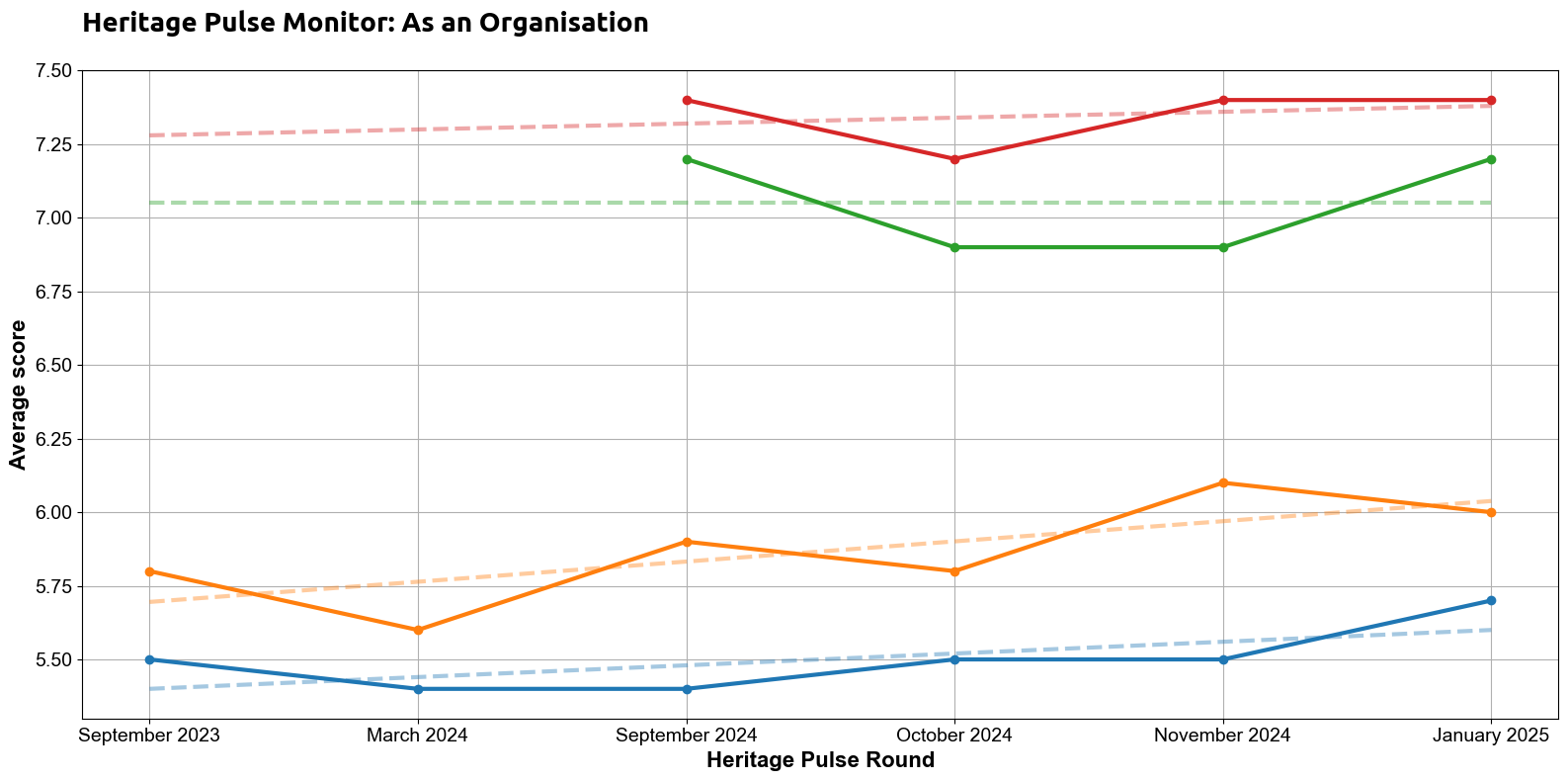

Panel members’ ability to retain and recruit new volunteers/staff as needed recorded its highest score in Heritage Pulse of 5.7 / 10. While there was a slight fall to 6 / 10, respondents’ belief they can adapt to income and cost challenges is on an upward trend.
Respondents’ belief that they will survive the coming 12 months increased 4% on November 2024 from 6.9 / 10 to 7.2 / 10, its highest score since September 2024.
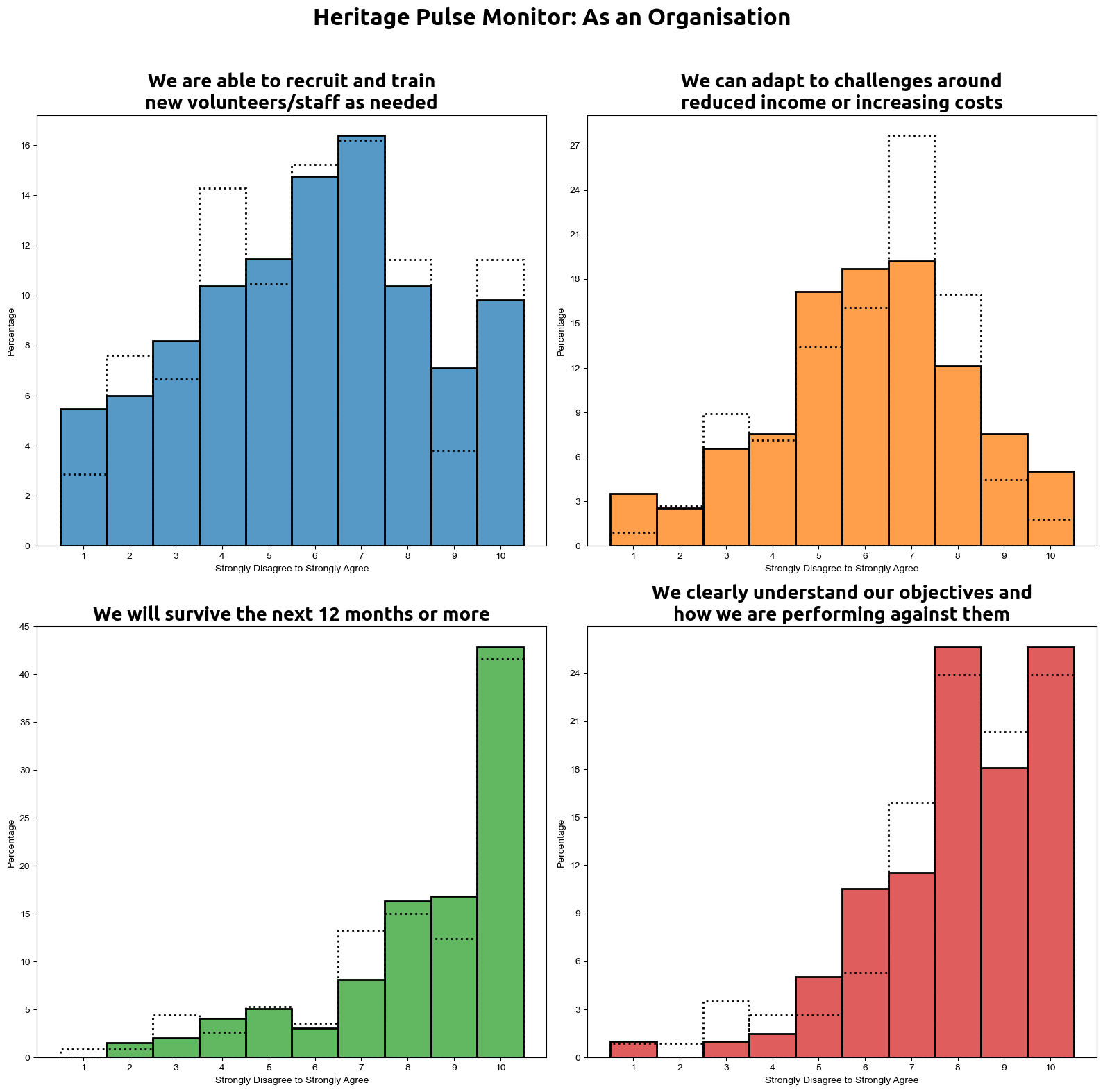
Where we saw a decline this month in respondents’ confidence in adapting to challenges around reduced income and increasing costs, we can analyse the distribution of responses this month (in colour) compared to the previous survey (dotted outline). In November 2024 almost half of respondents scored 7 or 8 out of 10 for this question, however in January less than a third of respondents gave the same answer.
This month the most disagreement amongst panel members in this section was around the recruitment and retention of staff, with almost two-thirds of respondents scoring between 4 and 8 in response to this question.
Despite the positive trend, respondents’ assessment of their personal impact falls


Respondents’ belief that they can adequately care for their collection / heritage and that their work is valued by their community saw slight falls in January, but both measures continue to trend upwards.
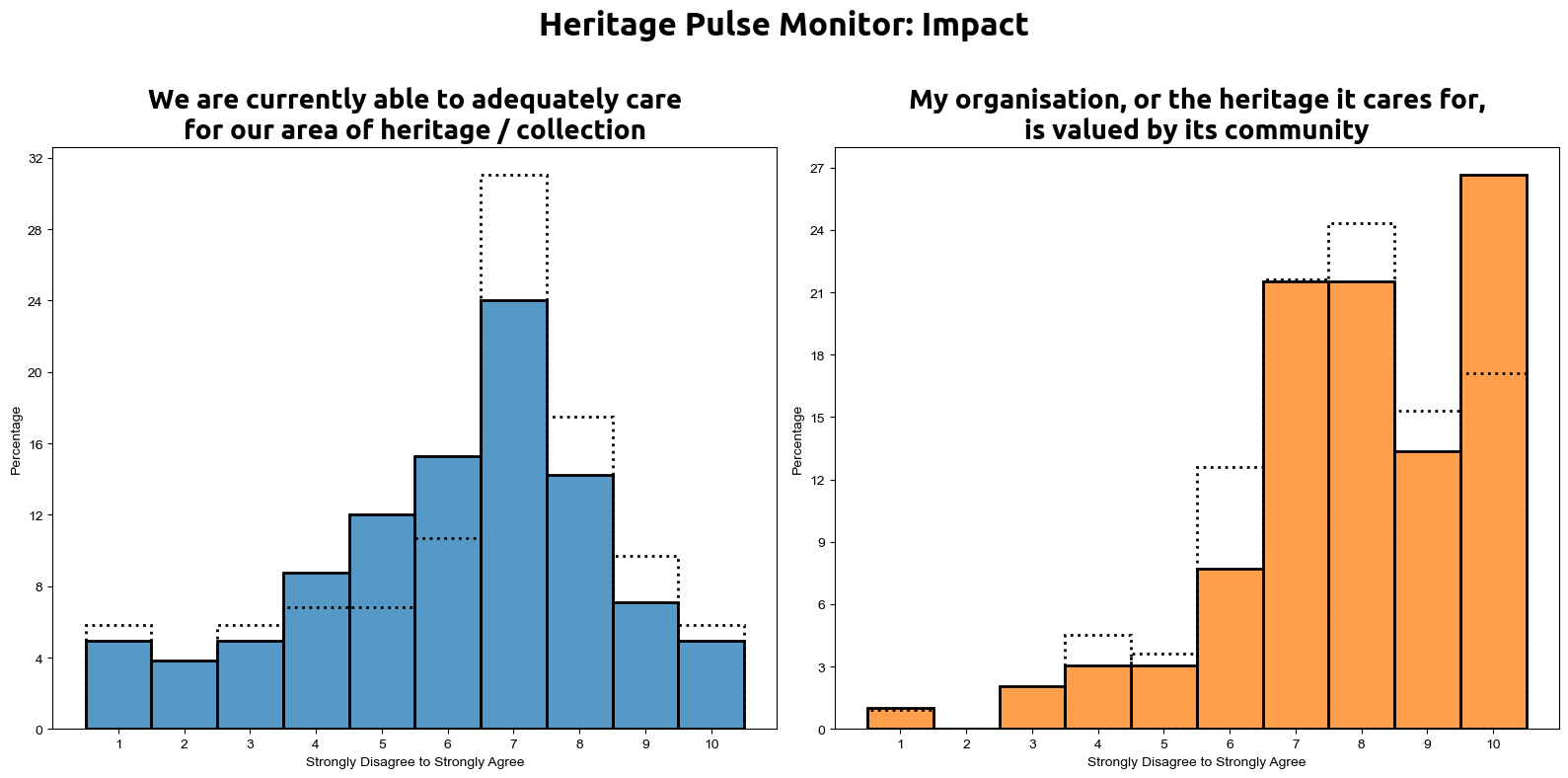
When looking at the distributions compared to November 2024, we can see that the decline in respondents’ belief that their heritage is valued is mitigated by the increase in panel members responding 10 / 10, the most common answer for this question. More than two-thirds of respondents gave a score of 7 or above for this measure.
When asked whether they can adequately care for their area of heritage/collection, we can see a clear shift to lower scores this month.
Respondents’ intention to remain at their current organisation falls
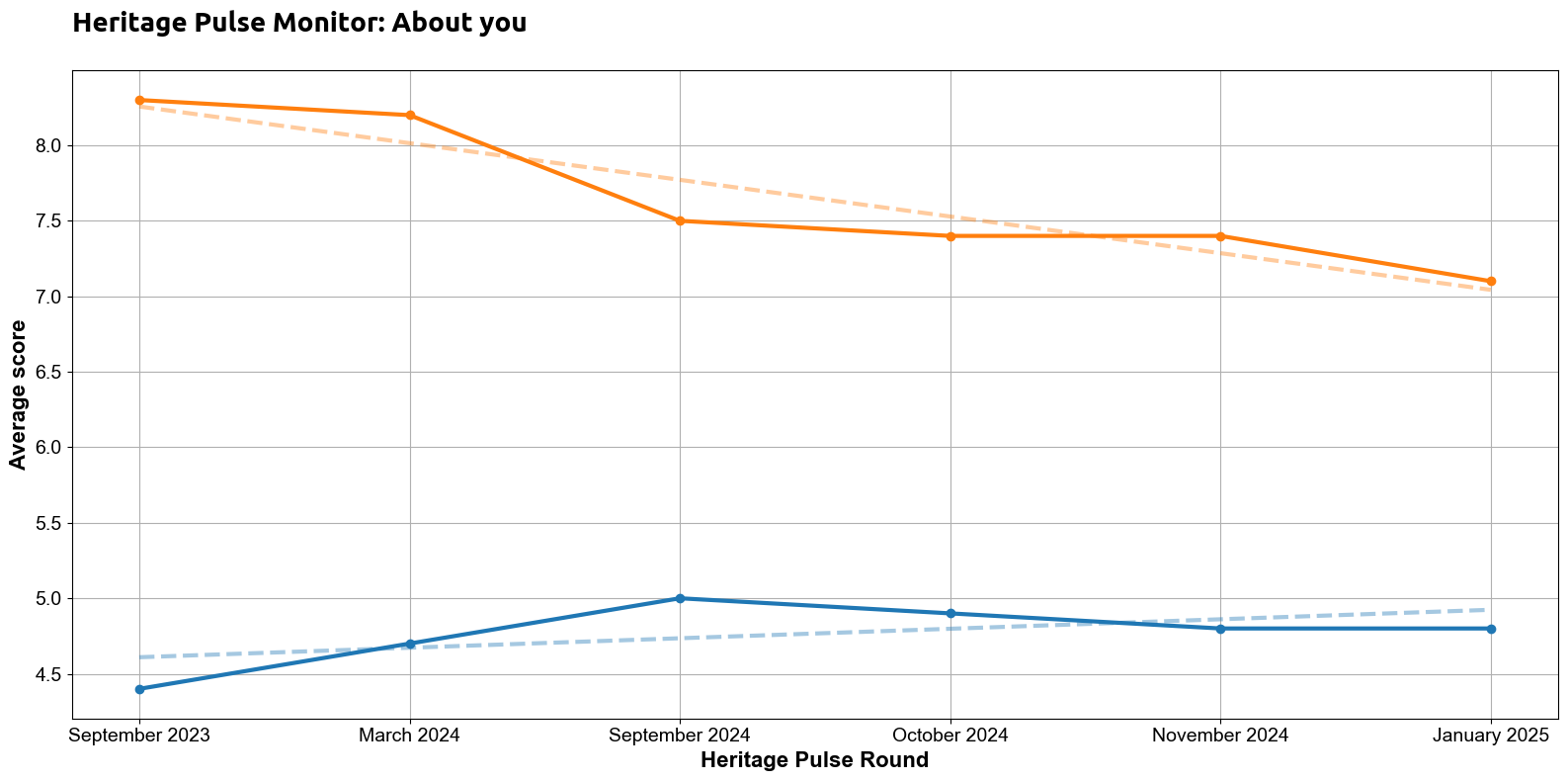

Panel members’ desire to stay at their current organisation for the following 12 months and beyond fell to 7.1 / 10, its lowest score since September 2023 and down 1.2 points in total over the same period.
The reported stress of participants remains stable on November 2024 at 4.8 / 10, but when looking at Heritage Pulse results over the lifetime of the survey, we see a slight upward trend.
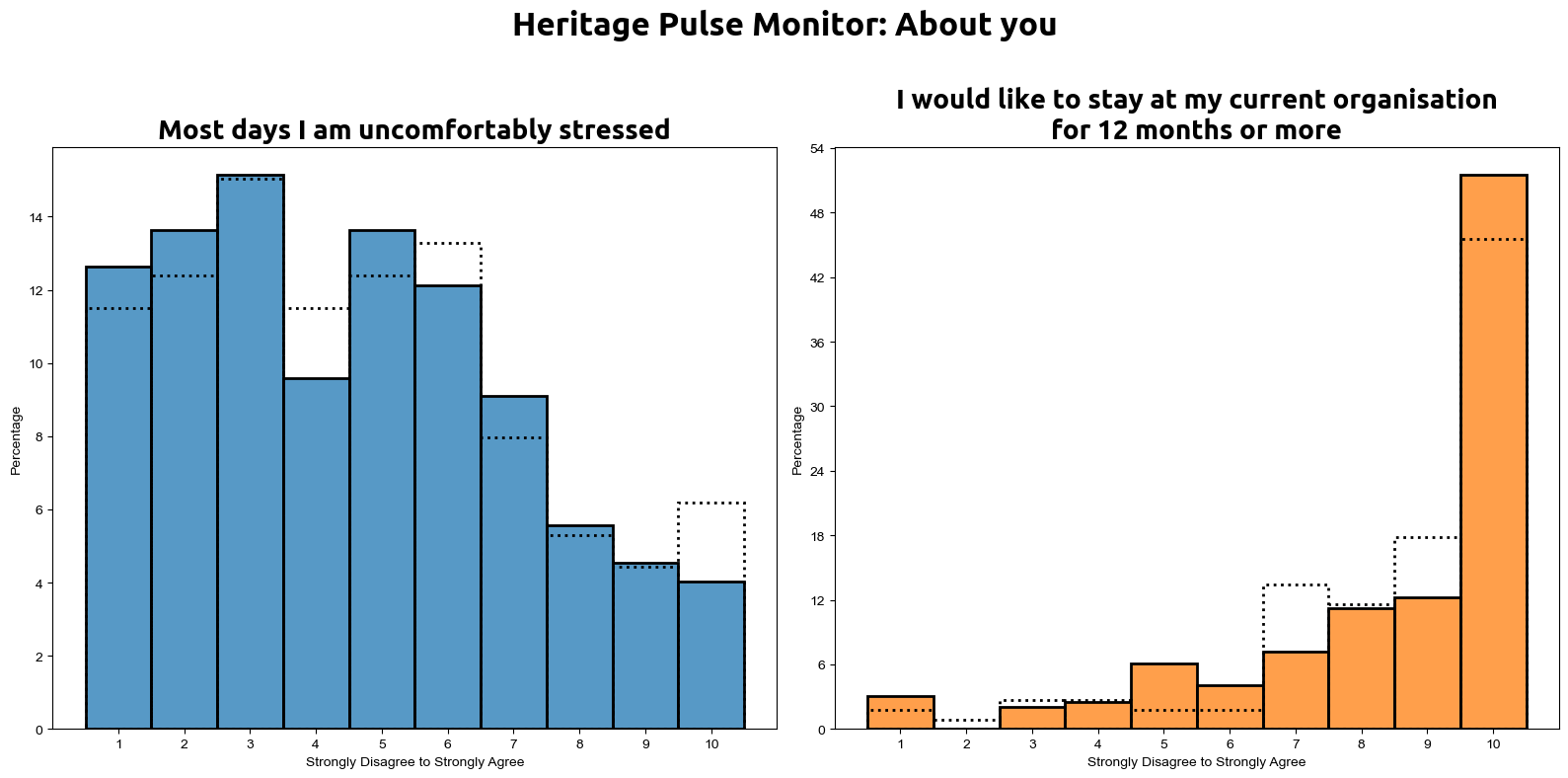
The distribution of responses in January was very similar to November 2024. When asked whether they are uncomfortably stressed most days, we saw the greatest dispersion of responses of any Pulse Monitor question.
More than half of panel members when asked if they would like to stay at their current organisation for 12 months or more responded with a score of 10 / 10, showing a positive outlook for most panel respondents, despite the overall decline in mean response.
How representative of the Heritage Pulse panel were the January 2025 respondents?
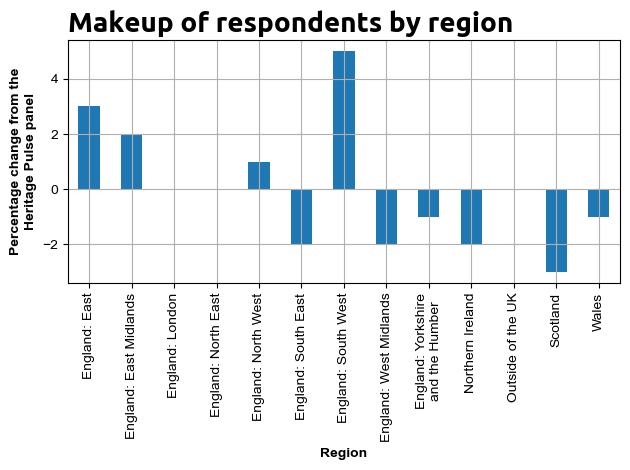
Compared to the entire panel, respondents based in the South West of England were the most overrepresented in this survey (+5%). By contrast, panel members in Scotland were the most underrepresented, with the total proportion of respondents being 3% lower than their position in the panel.
ENDS
Appendices
What three words would you use to describe the impact of National Lottery Heritage Fund funding on your organisation and its area of heritage?
Full list of responses submitted at least twice to the question:
- supportive: 23
- transformative: 22
- essential: 17
- vital: 13
- transformational: 12
- enabling: 12
- helpful: 11
- significant: 10
- important: 7
- challenging: 6
- innovative: 5
- impactful: 5
- useful: 4
- community: 4
- impact: 4
- welcome: 4
- crucial: 4
- change: 4
- positive: 3
- inclusive: 3
- heritage: 3
- empowering: 3
- amazing: 3
- flexible: 3
- great: 3
- focused: 3
- conservation: 3
- needed: 3
- inspiring: 3
- engagement: 3
- new: 3
- sustainability: 3
- building: 3
- confidence: 3
- necessary: 3
- leveraging: 2
- catalytic: 2
- reaching: 2
- makes: 2
- difference: 2
- established: 2
- authoritative: 2
- driven: 2
- encouraging: 2
- developmental: 2
- changing: 2
- saving: 2
- fundamental: 2
- creative: 2
- thinking: 2
- understanding: 2
- profile: 2
- timely: 2
- time: 2
- consuming: 2
- skills: 2
- generous: 2
- complex: 2
- hope: 2
- catalyst: 2
- growth: 2
- transforming: 2
- ambition: 2
- vision: 2
- comfortable: 2
- critical: 2
- limited: 2
- beneficial: 2
- invaluable: 2
- groundbreaking: 2
- unique: 2
- innovation: 2
- inspiration: 2
- frustrating: 2
- legacy: 2
- collaborative: 2
- valuable: 2
